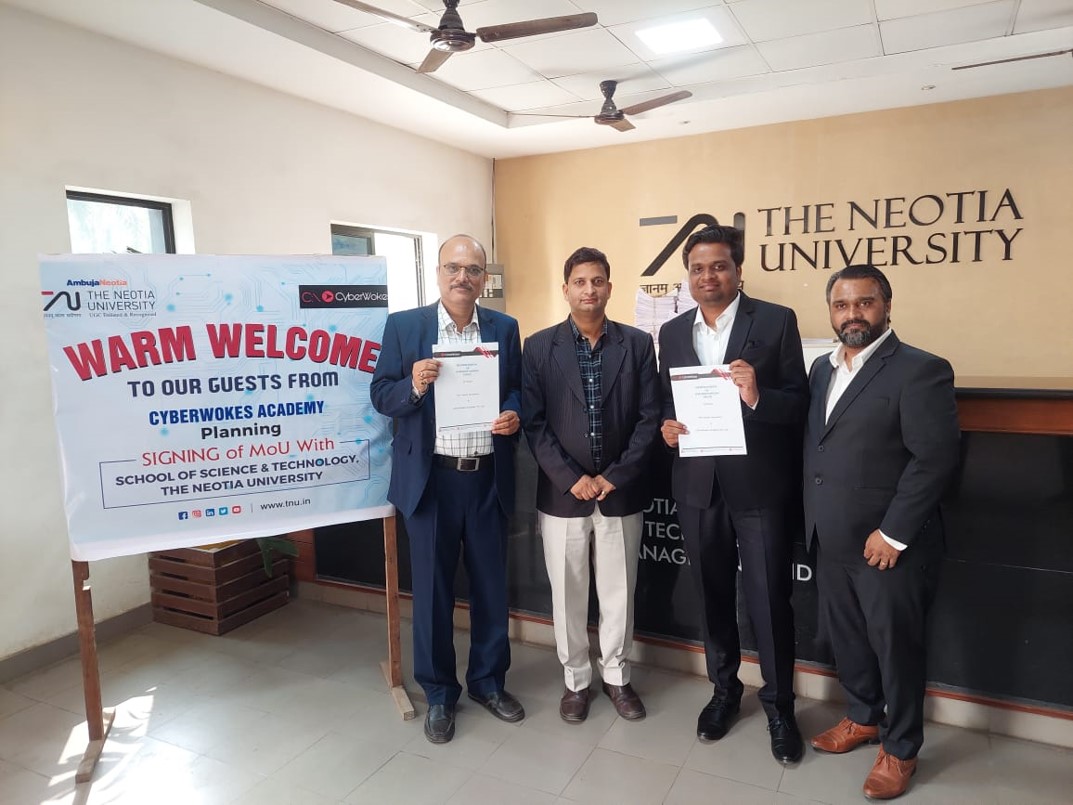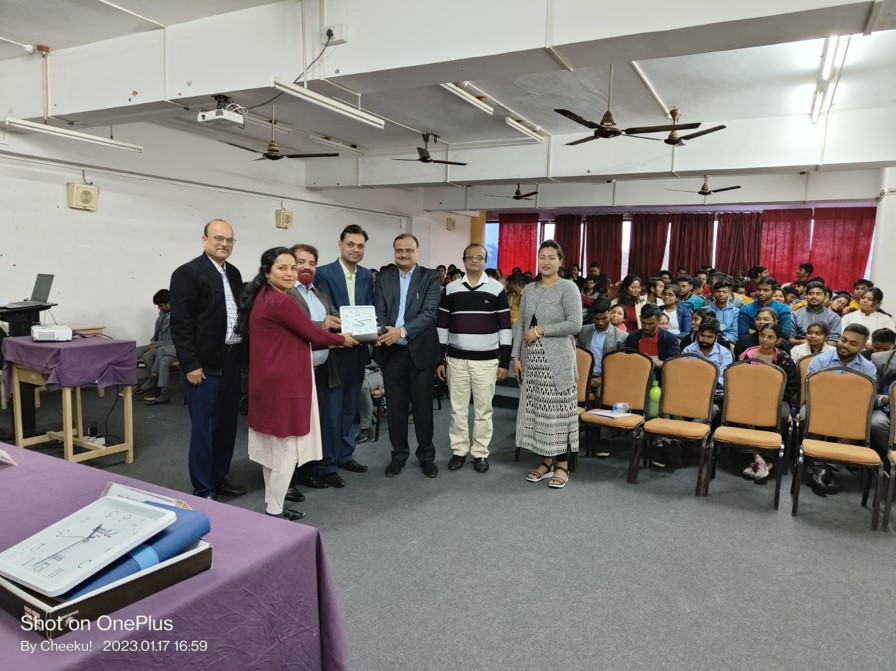- About Us
- Academics
- School of Agriculture and Allied Sciences
- School of Skill Development and Vocational Studies
- School of Science and Technology
- Undergraduate Programmes
- B.Tech in Robotics and Automation
- B.Tech in Computer Science & Engineering with Specialization in Cyber Security
- B.Tech in Computer Science & Engineering with Specialization in Artificial Intelligence & Machine Learning
- Bachelor of Computer Application
- B.Sc. (Hons.) in Biotechnology
- B.Sc. (Hons.) in Microbiology
- Lateral
- B.Tech in Robotics and Automation––LATERAL
- Bachelor of Computer Application – CREDIT TRANSFER
- B.Tech in Computer Science & Engineering with Specialization in Cyber Security – LATERAL
- B.Tech in Computer Science & Engineering with Specialization in Data Science – LATERAL
- B.Tech in Computer Science & Engineering with Specialization in Artificial Intelligence & Machine Learning (AI & ML) – LATERAL
- B.Sc. in Biotechnology –CREDIT TRANSFER
- B.Sc. in Biotechnology –CREDIT TRANSFER
- Postgraduate Programmes
- Ph.D Programmes
- Undergraduate Programmes
- School of Health Sciences
- Undergraduate Programmes
- B.Sc. (Hons.) in Applied Psychology
- Bachelor of Medical Laboratory Technology
- Bachelor of Physiotherapy
- Bachelor of Optometry
- B.Sc. in Radiology and Medical Imaging Technology
- Bachelor in Operation Theatre & Anesthesia Technology
- B.Sc. in Critical Care Technology
- Bachelor in Hospital Management
- B.Sc. (Hons.) in Nutrition and Dietetics
- B.Sc. in Rehabilitation Education in Neurodevelpmental Disorder
- Lateral
- B.Sc. in Critical Care Technology – LATERAL
- Bachelor in Operation Theatre & Anesthesia Technology – LATERAL
- B.Sc. (Hons.) in Applied Psychology – CREDIT TRANSFER
- Bachelor in Hospital Management – CREDIT TRANSFER
- Bachelor of Medical Laboratory Technology – LATERAL
- Bachelor of Physiotherapy – LATERAL
- Bachelor of Optometry – LATERAL
- B.Sc. Radiology and Medical Imaging Technology – LATERAL
- Postgraduate Programmes
- Ph.D Programmes
- Undergraduate Programmes
- School of Hospitality & Culinary Art
- School of Humanities, Management and Social Sciences
- Undergraduate Programmes
- Lateral
- B.Com (Hons.) with Specialization in Taxation & E-Accounting – CREDIT TRANSFER
- BBA (Hons.) – CREDIT TRANSFER
- BBA (Hons.) with Specialization in Finance – CREDIT TRANSFER
- BBA (Hons.) with Specialization in Marketing Management – CREDIT TRANSFER
- BBA (Hons.) with Specialization in Digital Marketing – CREDIT TRANSFER
- BBA (Hons.) with Specialization in Logistics & Supply Chain Management – CREDIT TRANSFER
- Postgraduate Programmes
- Ph.D Programmes
- School of Legal Studies
- School of Maritime Studies
- School of Nursing
- School of Pharmacy
- NEP
- Admissions
- Research
- Campus
- Notice Board
- Alumni
- Media
- NIRF
- Contact Us
- About Us▼
- Academics▼
- School of Agriculture and Allied Sciences▼
- School of Skill Development and Vocational Studies▼
- School of Science and Technology▼
- Undergraduate Programmes▼
- B.Tech in Robotics and Automation
- B.Tech in Computer Science & Engineering with Specialization in Cyber Security
- B.Tech in Computer Science & Engineering with Specialization in Artificial Intelligence & Machine Learning
- Bachelor of Computer Application
- B.Sc. (Hons.) in Biotechnology
- B.Sc. (Hons.) in Microbiology
- Lateral▼
- B.Tech in Robotics and Automation––LATERAL
- Bachelor of Computer Application – CREDIT TRANSFER
- B.Tech in Computer Science & Engineering with Specialization in Cyber Security – LATERAL
- B.Tech in Computer Science & Engineering with Specialization in Data Science – LATERAL
- B.Tech in Computer Science & Engineering with Specialization in Artificial Intelligence & Machine Learning (AI & ML) – LATERAL
- B.Sc. in Biotechnology –CREDIT TRANSFER
- B.Sc. in Biotechnology –CREDIT TRANSFER
- Postgraduate Programmes▼
- Ph.D Programmes▼
- Undergraduate Programmes
- School of Health Sciences▼
- Undergraduate Programmes▼
- B.Sc. (Hons.) in Applied Psychology
- Bachelor of Medical Laboratory Technology
- Bachelor of Physiotherapy
- Bachelor of Optometry
- B.Sc. in Radiology and Medical Imaging Technology
- Bachelor in Operation Theatre & Anesthesia Technology
- B.Sc. in Critical Care Technology
- Bachelor in Hospital Management
- B.Sc. (Hons.) in Nutrition and Dietetics
- B.Sc. in Rehabilitation Education in Neurodevelpmental Disorder
- Lateral▼
- B.Sc. in Critical Care Technology – LATERAL
- Bachelor in Operation Theatre & Anesthesia Technology – LATERAL
- B.Sc. (Hons.) in Applied Psychology – CREDIT TRANSFER
- Bachelor in Hospital Management – CREDIT TRANSFER
- Bachelor of Medical Laboratory Technology – LATERAL
- Bachelor of Physiotherapy – LATERAL
- Bachelor of Optometry – LATERAL
- B.Sc. Radiology and Medical Imaging Technology – LATERAL
- Postgraduate Programmes▼
- Ph.D Programmes▼
- Undergraduate Programmes
- School of Hospitality & Culinary Art▼
- School of Humanities, Management and Social Sciences▼
- Undergraduate Programmes▼
- Lateral▼
- B.Com (Hons.) with Specialization in Taxation & E-Accounting – CREDIT TRANSFER
- BBA (Hons.) – CREDIT TRANSFER
- BBA (Hons.) with Specialization in Finance – CREDIT TRANSFER
- BBA (Hons.) with Specialization in Marketing Management – CREDIT TRANSFER
- BBA (Hons.) with Specialization in Digital Marketing – CREDIT TRANSFER
- BBA (Hons.) with Specialization in Logistics & Supply Chain Management – CREDIT TRANSFER
- Postgraduate Programmes▼
- Ph.D Programmes▼
- Undergraduate Programmes
- School of Legal Studies▼
- School of Maritime Studies▼
- School of Nursing▼
- School of Pharmacy▼
- NEP
- School of Agriculture and Allied Sciences
- Admissions▼
- Research▼
- Campus▼
- Notice Board
- Alumni▼
- Media▼
- NIRF
- Contact Us














